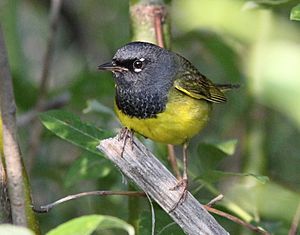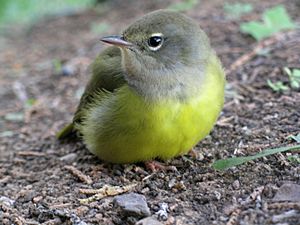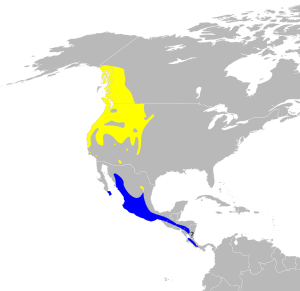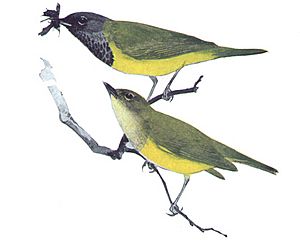MacGillivray's warbler facts for kids
Quick facts for kids MacGillivray's Warbler |
|
|---|---|
 |
|
| male | |
 |
|
| female | |
| Conservation status | |
| Scientific classification |
|
| Kingdom: | Animalia |
| Phylum: | Chordata |
| Class: | Aves |
| Order: | Passeriformes |
| Family: | Parulidae |
| Genus: | Geothlypis |
| Species: |
G. tolmiei
|
| Binomial name | |
| Geothlypis tolmiei (Townsend, 1839)
|
|
 |
|
| Range
breeding overwintering |
|
| Script error: The function "autoWithCaption" does not exist. | |
| Synonyms | |
|
Oporornis tolmiei |
|
Script error: No such module "Check for conflicting parameters".
The MacGillivray's warbler (Geothlypis tolmiei) is a small, active New World warbler. These birds like to stay close to the ground, often hidden in thick bushes. They are known for their beautiful songs.
Contents
About the MacGillivray's Warbler
Who Named This Bird?
The MacGillivray's warbler was named by John James Audubon. He chose the name to honor William MacGillivray, a Scottish bird expert. However, the bird was actually discovered by John Kirk Townsend. The second part of its scientific name, tolmiei, honors William Fraser Tolmie.
What Do They Look Like?
Adult MacGillivray's warblers have olive-green feathers on their backs. Their bellies are a dull yellow color.
- Male warblers have black heads and chests.
- Female and young birds have light gray heads.
Both males and females have a broken white ring around their eyes. This eye-ring helps tell them apart from similar birds.
How Do They Sing?
The song of the MacGillivray's warbler is quite special. It's a series of two-note sounds that get louder as they go. The song ends with two single notes. It sounds like jeeter jeeter jeeter JEETER JEETER jeet jeet.
How Big Are They?
MacGillivray's warblers are small birds.
- Length: They are about 3.9 to 5.9 inches (10 to 15 cm) long.
- Weight: They weigh around 0.3 to 0.5 ounces (9 to 13 grams). That's about as much as a few paperclips!
- Wingspan: Their wings can spread up to 7.5 inches (19 cm) wide.
Where Do MacGillivray's Warblers Live?
Their Summer Homes
MacGillivray's warblers are migratory birds. This means they travel long distances each year. They spend their summers in cool forests. You can find them in the western United States. They also live in the boreal forests of western Canada.
Their Winter Getaway
When autumn arrives, these warblers fly south. They travel all the way to Central America for the winter. There, they enjoy warmer weather in shrublands.
See also
 In Spanish: Chipe cabecigrís de Tolmie para niños
In Spanish: Chipe cabecigrís de Tolmie para niños



